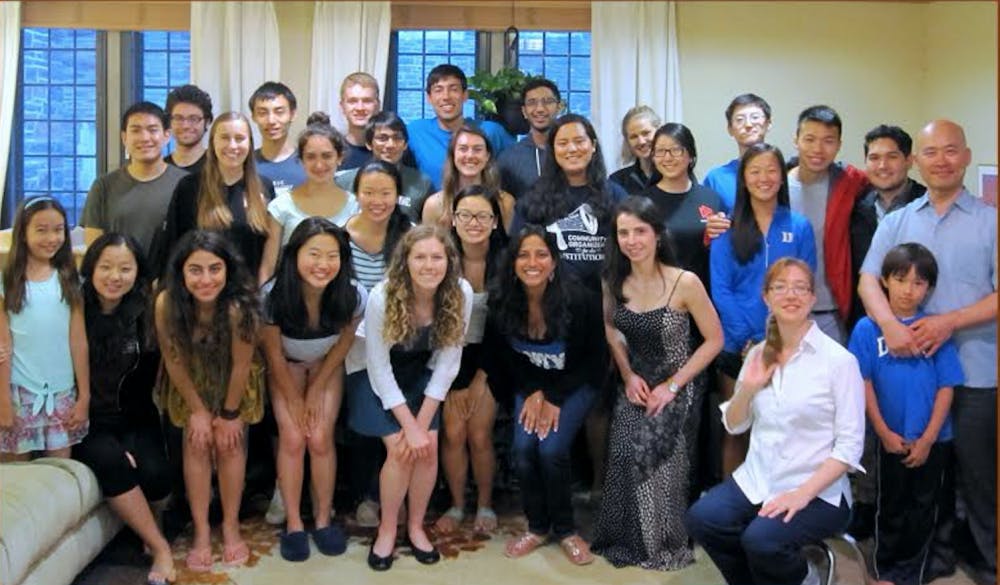The fall semester can be a challenging time for first-years as they search for their academic and social niches, but faculty-in-residence can help guide students through this transition period.
The FIR program places professors in East Campus dorms, where they serve as a sort of “dorm parent” and provide advice and support. FIRs also host a range of events to get to know the dorm residents.
Candis Watts Smith, associate professor of political science, is the FIR for Southgate and one of the few new faculty in the program this year.
“Living with students keeps you really humble, grounded and close to their concerns and way of life,” Smith said.
Kisha Daniels, assistant professor of the practice of education and another new FIR, lives in Gilbert-Addoms. Daniels appreciates the University’s focus on making sure students have a network of connections.
“Like I tell my advisees, I can be many things for you: I can be your hype man, I can be your shoulder to cry on, and if I can’t be any of those things, I can help you find that person,” Daniels said.
While FIRs described struggling to engage students during the pandemic, Daniels said that this year has gotten off to a smoother start.
“Even with the rocky COVID-19 start, I’ve still been able to make a lot of good connections with students, and I love having all of my advisees here in the building,” Daniels said. “It’s been nice seeing them and getting to know them.”
Some even offer opportunities to meet other professors and special guests.
Hsiao-Mei Ku, professor of the practice of music and FIR for Pegram, holds concerts and meet and greets in the dorm’s common room; these performances have featured musical guests like jazz singer Nnenna Freelon and saxophonist Branford Marsalis.
Catherine Admay, senior lecturer of public policy and FIR of Basset for the past seven years, holds guest speaker programs on a regular basis.
FIRs sometimes offer special events. Daniels created new programming for Family Weekend and organizes occasional walks downtown to local eateries. Smith holds a “Monday Meetup” to catch up with students every week. John Blackshear, associate vice provost for undergraduate education and FIR of Trinity, holds Thanksgiving dinner for students staying in Durham over break.
Outside of these events, FIRs are available for advice and emotional support. Ku believes this guidance is invaluable.
“The classroom is great, but that is one side of knowledge, there are a lot of things you don’t get,” Ku explained. “Who will tell you when you have a certain life problem to open a book to page 35, paragraph three to solve your problem? You learn by getting to know your classmates and getting to know your professors.”
Similarly, Smith tries to teach students skills that can only be obtained outside of the classroom.
“Usually the things that I’m telling them I’m also telling myself, so we’ll just have a conversation, it might be about time management, it might be about priorities, it might be about how to send a high quality email … we talk a lot about how to navigate your time as a student,” Smith said.
Daniels urges any students in need of support or those with time to spare to seek out their FIRs.
“Don’t be afraid to seek out your FIR, you don’t have to commit to every single event or program that your FIR has … if they take that step to get out and engage more with their FIR, they’ll be pleasantly surprised,” Daniels said.
Blackshear agrees with his colleagues in that the FIR program is a net benefit to the campus ecosystem.
“The greatest thing about living with students is the relationships that we get to establish, and they last,” Blackshear said. “The beautiful thing about faculty in residence is we are not house overseers, we are not there to modify behavior … nobody is doing this who is not heavily interested in student lives and intellectual development.”
“The biggest reward is helping students realize who they are, what works for them, and their passion," Blackshear said.
Get The Chronicle straight to your inbox
Signup for our weekly newsletter. Cancel at any time.
Ethan Niang is a Trinity sophomore and senior reporter of The Chronicle's 118th volume.

